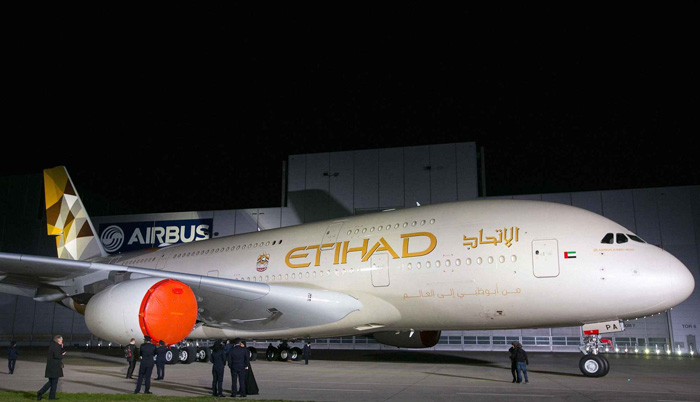![]() Home > World Business
Home > World Business
Etihad Airways’ $4 Billion Expansion Plan Stalls

Photographer Krisztian Bocsi/Bloomberg
![]() May 20th, 2017 | 09:38 AM |
May 20th, 2017 | 09:38 AM | ![]() 1023 views
1023 views
ABU DHABI
Deals quickly gave the Abu Dhabi carrier scale, but profits have been harder to come by.
In 2011, Etihad Airways Chief Executive Officer James Hogan hatched a bold strategy to catch up with the airline’s more established Persian Gulf rivals: buying stakes in smaller, cash-hungry carriers across three continents to cobble together enough passengers to propel the Abu Dhabi-based company into the ranks of the global aviation elite. But after more than $4 billion of share purchases, bond buyouts, and other investments, the wannabe airline superpower has little to show for its long-odds gamble.
“Etihad was seeking the equivalent of five years of organic growth overnight, but shortcuts in aviation rarely work,” says aviation analyst Mark Martin, who heads Dubai-based Martin Consultancy LLC. “Mostly you’re buying into bad debt, bad mistakes—and skeletons in the cupboard.”
That reality hit home on May 2 when Italy’s Alitalia SpA, in which Etihad holds a 49 percent stake after pouring in about €1 billion ($1.1 billion), filed for bankruptcy amid mounting losses. Meanwhile, Air Berlin Plc, the biggest beneficiary of Etihad’s largesse after receiving $2 billion, is bleeding red ink after being caught in a squeeze between lower-cost carriers and No. 1 German airline Deutsche Lufthansa AG.
Etihad in early May announced that Hogan, CEO since 2006, is no longer handling operations for the carrier and will depart the company on July 1. Now the Abu Dhabi state-controlled airline must decide whether to double down and continue backing his so-called equity alliance blueprint, or leave the table with its wallet—if not its pride—at least partially intact. Etihad in a statement said that some of the airlines in which it invested “faced greater challenges than they or we expected in restructuring their own businesses.” But the carrier said the partnerships had been vital in providing access to capacity-constrained airports and markets, especially in Europe and India. Still, the airline has initiated a strategic review, “which naturally also includes a review of the equity-partner strategy,” it said.
Chart: Etihad’s Equity Alliance
Hogan had been determined to catch rivals Emirates Group and Qatar Airways Ltd., which were reshaping the airline industry by exploiting the Gulf’s location as a global crossroads to establish intercontinental transfer hubs at their desert bases. All three airlines operate massive connection airports within a 235-mile stretch along the Gulf.
Etihad came late to the party, however, having been founded in 2003, 18 years after Dubai-based Emirates and 9 years after Qatar Airways, which operates a connecting hub in nearby Doha. Rather than relying on growth through gradual expansion, Etihad adopted Hogan’s strategy of enlarging Etihad’s footprint via acquisitions of stakes in a patchwork of smaller carriers, a strategy that called to mind Swissair’s ill-fated foray into minority holdings in the late 1990s. After buying stakes in struggling operators including the national airlines of Poland and Belgium, the once-renowned airline folded in 2002 amid crippling losses.
Hogan maintained that his approach was fundamentally different, aimed at boosting Etihad’s access to major global markets including Germany (via the partnership with Air Berlin), Italy (Alitalia), India (Jet Airways), and Australia (Virgin Australia Airlines). He gambled that Etihad’s eight partner carriers would feed enough connecting traffic through Abu Dhabi to make many more of its long-haul routes viable.
For a while it looked as if Hogan might just pull it off, especially as the collapse in oil prices in late 2014 drastically reduced costs across the industry. But cheaper jet fuel also encouraged rivals to add capacity, leading to a glut in seats and a downward spiral in fares. The ugly results: Air Berlin’s net loss jumped 70 percent, to €808 million, in 2016 from the year earlier, while Alitalia’s doubled, to more than €400 million, and Virgin Australia’s surged 140 percent, to A$225 million ($167 million).
Etihad faces a stark choice, according to Diogenis Papiomytis, a onetime executive at the airline who’s director of aerospace in Dubai at consulting firm Frost & Sullivan Inc.: Pour good money after bad and continue building its equity alliance, or sever ties and focus on its own business at a time when earnings across the oil-dependent Gulf are under siege.
Although Etihad said after Alitalia’s collapse it would extend an 18-month financial lifeline to ailing Air Berlin, it’s unclear whether Hogan’s successor—expected to be named in a few weeks—will change course. Papiomytis says the company must take the “tough decision” of accepting its status as the Gulf’s No. 3 airline, focus on developing its own premium brand, and “no longer invest in failing carriers.”
The bottom line: Abu Dhabi’s Etihad Airways has invested in eight carriers to stitch together a global network, but profits have been harder to come by.
Source:
courtesy of BLOOMBERG
by Christopher Jasper and Deena Kamel
If you have any stories or news that you would like to share with the global online community, please feel free to share it with us by contacting us directly at [email protected]